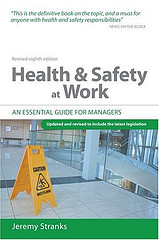A new government initiative in the UK to scrap certain regulations that create an unnecessary burden on small to medium businesses has been set in motion recently. The ‘Red Tape Challenge’ aims to get rid of regulations across the board which require businesses to spend an unfeasible amount of time or money on carrying them out where there is little or no immediate risk.

What Form Will The Changes Take?
Current legislation deems that thousands of businesses must undergo regular health and safety checks regardless of risk factor. These pro-active checks will be finished in all but the highest risk businesses, leaving those who do not flag up as potential risks free to carry on as normal. Time and money spent on accommodating inspectors and maintaining the highest possible standards will be able to be utilised elsewhere. Opponents of the scheme say this is paving the way for shoddy health and safety observations, but the government is adamant that the businesses that will suddenly not be inspected are those who have regularly demonstrated that they do not need big brother watching over them to get it right.
Who Will Be Affected?
High risk businesses which will still be subjected to regular inspections include those industries such as construction, where health and safety priorities are high. Also liable to receive regular inspections under the new scheme are businesses which have previously been flagged up as not meeting health and safety minimum standards or those who have repeatedly flouted regulations. The vast majority of low risk businesses will now not have to undergo regular inspections.
How Do We Know Minimum Health & Safety Requirements Will Still Be Met?
The changes in regulation are not aimed at altering standards but at allowing businesses to police themselves. Any business who used to receive inspections and who will now not under the new laws will still be required to submit to a code of conduct contract. The new measures aim to eradicate needless compensation claims where the business is not at fault yet without compromising on safety standards.
For example, employers will still have an obligation to provide the minimum in ergonomic office chairs for workers who spend prolonged periods of time sitting down. The difference will be that there will be no outside body checking up on this unless a problem is reported by an employee. Workers who feel their job is affecting their health and are struggling to get a satisfactory result from their superiors will still have the same rights of complaint as before, as will customers or visitors who injure themselves due to faulty equipment or other reasons that should have been tackled by the property owner.
This post was provided on behalf of www.chairoffice.co.uk
image attribution 1|2|3|4

